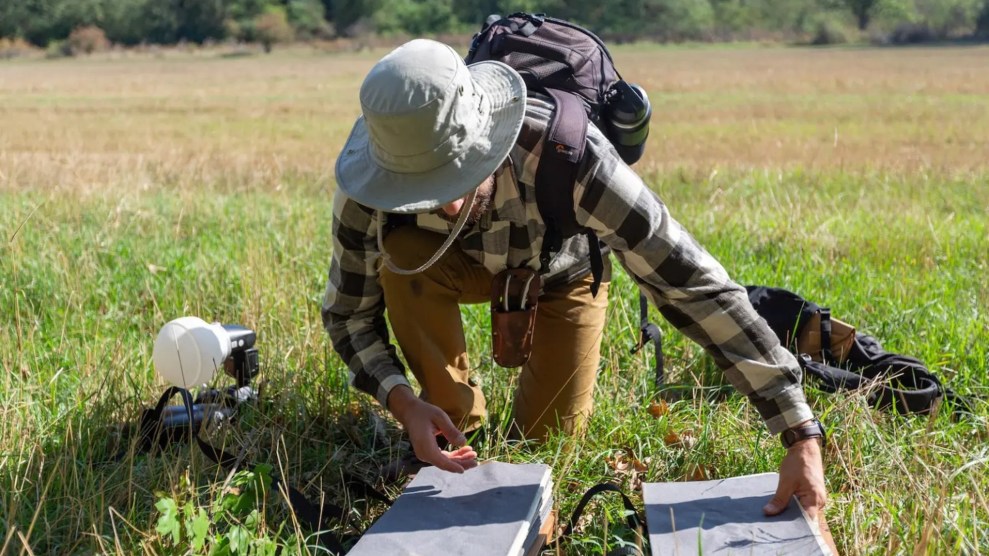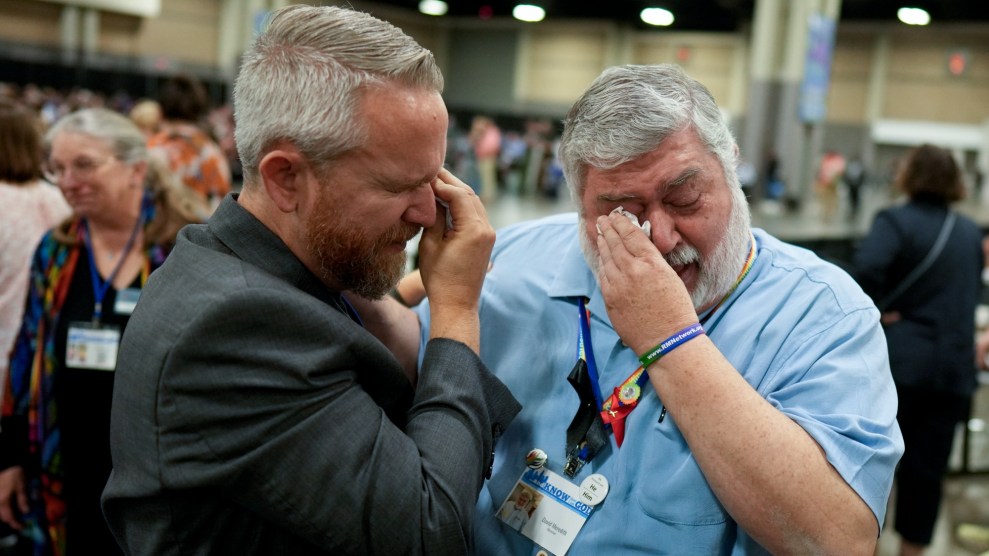The summer of 2009 hadn’t even begun when Marcia Powell, a 48-year old inmate at Arizona’s Perryville Prison, was baked to death. Powell, whom court records show had a history of schizophrenia, substance abuse, and mild mental retardation, was serving a 27-month sentence for prostitution. At about 11 a.m. on May 19, a day when the Arizona sun had driven the temperature to 108 degrees, she was parked outdoors in an unroofed, wire-fenced holding cell while awaiting transfer to another part of the prison. A deputy warden and two guards had been stationed in a control center 20 yards away, but nearly four hours had passed when she was found collapsed on the floor of the human cage. Doctors at a local hospital pronounced Powell comatose from heat stroke, and she died later that night after being taken off life support. Two local churches stepped in to provide a proper funeral and burial.
Arizona Department of Corrections director Charles Ryan said the guards had been suspended pending a criminal investigation. But just yesterday, the Maricopa County Medical Examiner ruled the death an accident, caused by “complications of hyperthermia due to environmental heat exposure.” This despite the fact that Powell had blistering and first and second degree “thermal injuries” on face, arms, and upper body.
Ryan also expressed “condolences to Ms. Powell’s family and loved ones”–a strange statement, considering Ryan had made the decision to quickly pull the plug on his comatose prisoner because, he said, no next of kin could be found. In fact, as Stephen Lemons of the Phoenix New Times has reported, Powell was judged an “incapacitated adult” and placed under public guardianship–but her guardians were not consulted before the ADC elected to let her die. Lemons also noted some unsavory chapters in Ryan’s recent career:
Ryan’s own bio on the ADC Web site touts that he was “assistant program manager for the Department of Justice overseeing the Iraqi Prison System for almost four years.” Ryan was contracted by the DOJ to help rebuild Iraqi prisons, one of those being the notorious Abu Ghraib.
Following Powell’s death, Ryan banned most uses of unshaded outdoor holding cells in Arizona, except in “extraordinary circumstances.” Most Southern states already restrict their use. But baking in the sun is only one of many ways to die in America’s prisons in the summertime. Recent years have seen scattered reports of heat-related prison deaths in California and Texas, among others. The prevalence of mental illness among the victims may be linked to anti-psychotic drugs, which raise the body temperature and cause dehydration, and at the same time have a tranquilizing effect that may mask thirst.
In 2006, 21-year-old Timothy Souders, another mentally ill prisoner, died of heat exhaustion and dehydration at a Jackson, Michigan prison during an August heat wave. For the four days prior to his death, Souders had been shackled to a cement slab in solitary confinement because he had been acting up. That entire period was captured on surveillance videotapes, which according to news reports clearly showed his mental and physical deterioration.
The vast majority of U.S. civilian prisons and jails are not air conditioned. (In contrast, the U.S. made a point of building new air-conditioned facilities for prisoners at Guantanamo Bay, and phasing out the older structures.) In Texas, only 19 of 112 prisons have air-conditioning. Earlier this summer, the chair of Texas State Senate’s Judiciary Committee, John Whitmire (D-Houston), told the Houston Chronicle that enduring the heat is “part of the reality of going to prison. There are a lot of inconveniences to serving time. There’s no question it’s hot.” He said he thought few Texans would be sympathetic to the prisoners’ suffering.
Apparently anticipating a similar lack of sympathy, the Florida Department of Corrections proudly advertises the absence of air-conditioning in most of its prisons. On a web page that debunks a host of “misconceptions” that might indicate soft treatment of Florida’s prisoners, it assures readers that the majority of inmates live without air-conditioning or cable television.
In a 2002 report on the risks of heat-related illness at the Mississippi State Penitentiary in Parchman, compiled for the ACLU, a physician who reviewed conditions on Death Row wrote the following:
An individual free to respond to the stress created by a hot environment would normally take steps to cool his body. If no air conditioning were available, he would at least respond by seeking a cooler location, blocking out radiant heat from the sun by positioning himself in the shade or screening himself from the sun, maximizing evaporation by wetting his body and clothes with water and using fans to create cross-ventilation, and moving away from physical structures which absorb and radiate heat.
None of these natural survival responses to excessive heat are available to the Death Row prisoners. The prisoners’ cells, especially Willie Russell’s Plexiglas covered cell, are stifling hot yet prisoners have to close their windows and cover their bodies at night despite intense heat in order to protect themselves from mosquitoes and other insects. Many of the prisoners have no access to fans, either because they are too poor to buy fans or because their fans have been confiscated as punishment. They have infrequent access to cooling showers, and sometimes, even access to water is extremely limited. The prisoners are not allowed to shade their windows from direct sunlight. They have extremely limited access to the outdoor exercise-pens and in any event those pens provide no relief from the heat because they are not shaded….
It is my opinion, based on my observations during my visit to Unit 32-C, Death Row and on my training, experience, and familiarity with the extensive body of medical literature on the subject of thermoregulation, that all of the inmates on Death Row are at high risk of heat stroke and heat-related illness.
A first-hand account of enduring the summer heat at the nation’s largest maximum-security prison, the Louisiana State Penitentiary at Angola, was provided by Kenny “Zulu” Whitmore. Whitmore, who has served more than 30 years of a life sentence, much of it in solitary confinement, kept a journal during a 2007 August heat wave:
August: It was so hot in here last night…I looked for the open flame in the cell. During the day you expect it to be 100 degrees, but not at night. More is yet to come.
9 August: The fire inspector came on the tier today doing the same fake B/S, but he was soaking wet b/c it is so hot in here. He was RED RED in the face like he was going to pass out. He was looking at us like Lord, give me their endurance.
12 August: I could not sleep last night. It had to be at least 98 degrees in here. I passed out around 2.20 am and got up at 5.14…I have not stopped sweating since yesterday….
31 August: The last day of hell month. This had to be the hottest for August in 200 years.
More recently, in letters to a friend, Whitmore described this past summer at “the Gola”:
June 11, 2009: Heat is on in the Gola, 93 degrees. I would have replied yesterday, but man it was so hot in here and I sweated all day. So I am writing before it gets too hot. And it’s just June. It was 76 degrees that morning at 5.30 am and 94 degrees after twelve noon. It should get that hot today too….
June 27, 2009: Hot n Humid Gola 99 degrees. If you heard that it’s getting hot in Angola, you heard wrong, because it have been steaming hot in Angola for the whole month of June but I know H will be alright, even at his age he can stand the heat. Plus: he knows what to do to cool down some: put some water on the floor and lay in it or put a wet sweat shirt on to stay cool….
July 12, 2009: The sweatbox Louisiana. With temperature 98 degrees everybody is on the floor. All you need is to wet it or your clothes. It’s all about survival in this man made hell….
August 10, 2009: I ran like a wild horse in that 96 degree heat today. I sweated all my body liquids so I had to replace it by drinking water the whole of the day. Only the strong survive.















